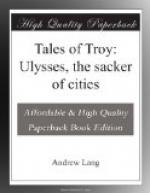Tyndarus first made all the princes take an oath that they would stand by the prince whom he chose, and would fight for him in all his quarrels. Then he named for her husband Menelaus, King of Lacedaemon. He was a very brave man, but not one of the strongest; he was not such a fighter as the gigantic Aias, the tallest and strongest of men; or as Diomede, the friend of Ulysses; or as his own brother, Agamemnon, the King of the rich city of Mycenae, who was chief over all other princes, and general of the whole army in war. The great lions carved in stone that seemed to guard his city are still standing above the gate through which Agamemnon used to drive his chariot.
The man who proved to be the best fighter of all, Achilles, was not among the lovers of Helen, for he was still a boy, and his mother, Thetis of the silver feet, a goddess of the sea, had sent him to be brought up as a girl, among the daughters of Lycomedes of Scyros, in an island far away. Thetis did this because Achilles was her only child, and there was a prophecy that, if he went to the wars, he would win the greatest glory, but die very young, and never see his mother again. She thought that if war broke out he would not be found hiding in girl’s dress, among girls, far away.
So at last, after thinking over the matter for long, Tyndarus gave fair Helen to Menelaus, the rich King of Lacedaemon; and her twin sister Clytaemnestra, who was also very beautiful, was given to King Agamemnon, the chief over all the princes. They all lived very happily together at first, but not for long.
In the meantime King Tyndarus spoke to his brother Icarius, who had a daughter named Penelope. She also was very pretty, but not nearly so beautiful as her cousin, fair Helen, and we know that Penelope was not very fond of her cousin. Icarius, admiring the strength and wisdom of Ulysses, gave him his daughter Penelope to be his wife, and Ulysses loved her very dearly, no man and wife were ever dearer to each other. They went away together to rocky Ithaca, and perhaps Penelope was not sorry that a wide sea lay between her home and that of Helen; for Helen was not only the fairest woman that ever lived in the world, but she was so kind and gracious and charming that no man could see her without loving her. When she was only a child, the famous prince Theseus, who was famous in Greek Story, carried her away to his own city of Athens, meaning to marry her when she grew up, and even at that time, there was a war for her sake, for her brothers followed Theseus with an army, and fought him, and brought her home.




